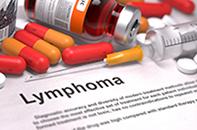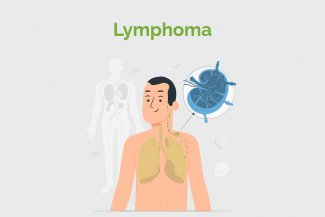
There are roughly over 60 types of lymphomas which are commonly grouped as Hodgkin and non-Hodgkin. Symptoms can be general and can be seen almost anywhere in the body not just the area where the cancer is around.
Signs and Symptoms of Hodgkin's Lymphoma
Approximately one-third of the patients may have disease-related symptoms, including B symptoms and pruritis (itching of the skin). Less commonly, patients may report pain in involved regions after ingestion of alcohol.
B symptoms are defined as recurrent unexplained fever higher than 101.5°F, recurrent drenching night sweats, and unexplained weight loss greater than 10% of body weight within the past 6 months.
More than 80% of patients with HL have enlargement of lymph nodes that are present above the diaphragm. (Diaphragm is a sheet of muscle that separates the thoracic cavity from the abdominal cavity. It mainly helps in respiration). Fewer than 20% of the patients have enlargement of lymph nodes below the diaphragm.
Hodgkin’s lymphoma may also involve spleen, lungs, liver, and bone marrow.
Signs and symptoms for non-Hodgkin’s lymphoma
Signs and symptoms of low-grade lymphomas include the following:
- Painless and slowly progressive swelling of lymph nodes
- Enlargement of extranodal organs such as spleen
- Fatigue/weakness, fever, night sweats, weight loss
Intermediate-grade and high-grade lymphomas have a more varied clinical presentation, including the following:
- Lymphadenopathy (enlarged lymph nodes) in most patients
- Extranodal involvement: In more than one third of patients, most common sites are skin, bone marrow, sinuses, thyroid, CNS (central nervous system)
- B symptoms: Temperature >38°C, night sweats, weight loss >10% from baseline within 6 months; in approximately 30-40% of patients.
Advanced stage
Fatigue/weakness, fever, night sweats, weight loss
Symptoms of Burkitt’s Lymphoma
Symptoms depend on the type of Burkitt’s lymphoma.
The endemic (African) variant usually starts as tumours of the jaw or other facial bones. It also can affect the gastrointestinal tract, ovaries and breasts and can spread to the central nervous system, causing nerve damage, weakness, and paralysis.
Sporadic and Immunodeficiency-Associated types more commonly start in the bowel and form a bulky tumour mass in the abdomen, often with massive involvement of the liver, spleen and bone marrow. These variants also can start in the ovaries, testes, or other organs, and spread to the brain and spinal fluid.














